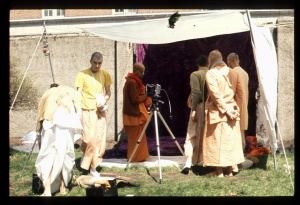SB 4.29.41: Difference between revisions
m (1 revision(s)) |
No edit summary |
||
| Line 1: | Line 1: | ||
{{info | {{info | ||
|speaker= | |speaker=Nārada Muni | ||
|listener=King | |listener=King Prācīnabarhiṣat | ||
}} | }} | ||
[[Category:Srimad-Bhagavatam - Canto 04 Chapter 29]] | |||
[[Category:Bhagavatam Verses Spoken by Narada Muni - Vanisource|042941]] | |||
<div style="float:left">'''[[Srimad-Bhagavatam]] - [[SB 4|Fourth Canto]] - [[SB 4.29: Talks Between Narada and King Pracinabarhi|Chapter 29: Talks Between Nārada and King Prācīnabarhi]]'''</div> | |||
<div style="float:right">[[File:Go-previous.png|link=SB 4.29.39-40]] '''[[SB 4.29.39-40]] - [[SB 4.29.42-44]]''' [[File:Go-next.png|link=SB 4.29.42-44]]</div> | |||
{{RandomImage}} | |||
==== TEXT 41 ==== | ==== TEXT 41 ==== | ||
<div | <div class="verse"> | ||
etair upadruto nityaṁ | :etair upadruto nityaṁ | ||
jīva-lokaḥ svabhāvajaiḥ | :jīva-lokaḥ svabhāvajaiḥ | ||
na karoti harer nūnaṁ | :na karoti harer nūnaṁ | ||
kathāmṛta-nidhau ratim | :kathāmṛta-nidhau ratim | ||
</div> | </div> | ||
| Line 16: | Line 22: | ||
==== SYNONYMS ==== | ==== SYNONYMS ==== | ||
<div | <div class="synonyms"> | ||
''etaiḥ''—by these; ''upadrutaḥ''—disturbed; ''nityam''—always; ''jīva-lokaḥ''—the conditioned soul in the material world; ''sva-bhāva-jaiḥ''—natural; ''na karoti''—does not do; ''hareḥ''—of the Supreme Personality of Godhead; ''nūnam''—certainly; ''kathā''—of the words; ''amṛta''—of nectar; ''nidhau''—in the ocean; ''ratim''—attachment. | |||
</div> | </div> | ||
| Line 23: | Line 29: | ||
==== TRANSLATION ==== | ==== TRANSLATION ==== | ||
<div | <div class="translation"> | ||
Because the conditioned soul is always disturbed by the bodily necessities such as hunger and thirst, he has very little time to cultivate attachment to hearing the nectarean words of the Supreme Personality of Godhead. | Because the conditioned soul is always disturbed by the bodily necessities such as hunger and thirst, he has very little time to cultivate attachment to hearing the nectarean words of the Supreme Personality of Godhead. | ||
</div> | </div> | ||
| Line 30: | Line 36: | ||
==== PURPORT ==== | ==== PURPORT ==== | ||
<div | <div class="purport"> | ||
Unless one is associated with devotees, he cannot cultivate Kṛṣṇa consciousness. Nirjana- | Unless one is associated with devotees, he cannot cultivate Kṛṣṇa consciousness. ''Nirjana-bhajana''—cultivating Kṛṣṇa consciousness in a solitary place—is not possible for the neophyte, for he will be disturbed by the bodily necessities (eating, sleeping, mating and defending). Being so disturbed, one cannot cultivate Kṛṣṇa consciousness. We therefore see that devotees known as ''sahajiyā'', who make everything very easy, do not associate with advanced devotees. Such persons, in the name of devotional activities, are addicted to all kinds of sinful acts—illicit sex, intoxication, gambling and meat-eating. There are many so-called devotees passing themselves off as devotees while engaging in these sinful activities. In other words, one who is influenced by sinful activity cannot be accepted as a person in Kṛṣṇa consciousness. A person addicted to sinful life cannot develop Kṛṣṇa consciousness, as indicated in this verse. | ||
</div> | </div> | ||
__NOTOC__ | |||
<div style="float:right; clear:both;">[[File:Go-previous.png|link=SB 4.29.39-40]] '''[[SB 4.29.39-40]] - [[SB 4.29.42-44]]''' [[File:Go-next.png|link=SB 4.29.42-44]]</div> | |||
__NOTOC__ | |||
__NOEDITSECTION__ | |||
Revision as of 14:36, 7 June 2021

A.C. Bhaktivedanta Swami Prabhupada
TEXT 41
- etair upadruto nityaṁ
- jīva-lokaḥ svabhāvajaiḥ
- na karoti harer nūnaṁ
- kathāmṛta-nidhau ratim
SYNONYMS
etaiḥ—by these; upadrutaḥ—disturbed; nityam—always; jīva-lokaḥ—the conditioned soul in the material world; sva-bhāva-jaiḥ—natural; na karoti—does not do; hareḥ—of the Supreme Personality of Godhead; nūnam—certainly; kathā—of the words; amṛta—of nectar; nidhau—in the ocean; ratim—attachment.
TRANSLATION
Because the conditioned soul is always disturbed by the bodily necessities such as hunger and thirst, he has very little time to cultivate attachment to hearing the nectarean words of the Supreme Personality of Godhead.
PURPORT
Unless one is associated with devotees, he cannot cultivate Kṛṣṇa consciousness. Nirjana-bhajana—cultivating Kṛṣṇa consciousness in a solitary place—is not possible for the neophyte, for he will be disturbed by the bodily necessities (eating, sleeping, mating and defending). Being so disturbed, one cannot cultivate Kṛṣṇa consciousness. We therefore see that devotees known as sahajiyā, who make everything very easy, do not associate with advanced devotees. Such persons, in the name of devotional activities, are addicted to all kinds of sinful acts—illicit sex, intoxication, gambling and meat-eating. There are many so-called devotees passing themselves off as devotees while engaging in these sinful activities. In other words, one who is influenced by sinful activity cannot be accepted as a person in Kṛṣṇa consciousness. A person addicted to sinful life cannot develop Kṛṣṇa consciousness, as indicated in this verse.